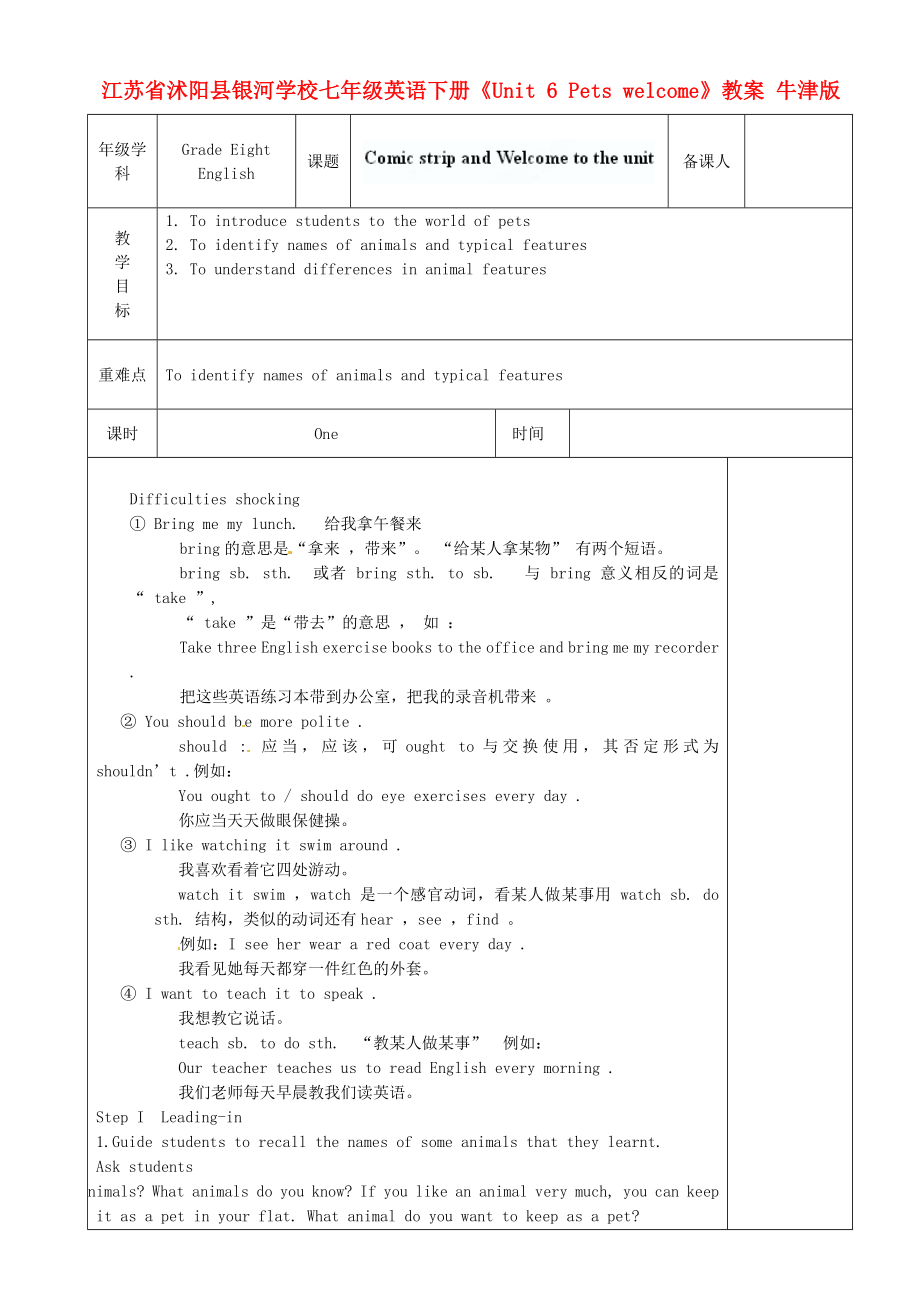《江蘇省沭陽(yáng)縣銀河學(xué)校七年級(jí)英語(yǔ)下冊(cè)《Unit 6 Pets Welcome》教案 牛津版》由會(huì)員分享�����,可在線閱讀�,更多相關(guān)《江蘇省沭陽(yáng)縣銀河學(xué)校七年級(jí)英語(yǔ)下冊(cè)《Unit 6 Pets Welcome》教案 牛津版(3頁(yè)珍藏版)》請(qǐng)?jiān)谘b配圖網(wǎng)上搜索��。
1�����、江蘇省沭陽(yáng)縣銀河學(xué)校七年級(jí)英語(yǔ)下冊(cè)《Unit 6 Pets welcome》教案 牛津版
年級(jí)學(xué)科
Grade Eight
English
課題
備課人
教
學(xué)
目
標(biāo)
1. To introduce students to the world of pets
2. To identify names of animals and typical features
3. To understand differences in animal features
重難點(diǎn)
To identify names of animals and typical featu
2�、res
課時(shí)
One
時(shí)間
Difficulties shocking
① Bring me my lunch. 給我拿午餐來(lái)
bring的意思是“拿來(lái) ,帶來(lái)”�����。 “給某人拿某物” 有兩個(gè)短語(yǔ)。
bring sb. sth. 或者 bring sth. to sb. 與 bring 意義相反的詞是“ take ”,
“ take ”是“帶去”的意思 ��, 如 :
Take three English exercise books to the office and bring me my recorder .
把這些英語(yǔ)練習(xí)本帶到辦公室����,把我的錄音
3�、機(jī)帶來(lái) ���。
② You should be more polite .
should : 應(yīng)當(dāng)���,應(yīng)該,可ought to與交換使用�,其否定形式為 shouldn’t .例如:
You ought to / should do eye exercises every day .
你應(yīng)當(dāng)天天做眼保健操�����。
③ I like watching it swim around .
我喜歡看著它四處游動(dòng)��。
watch it swim ����,watch 是一個(gè)感官動(dòng)詞��,看某人做某事用 watch sb. do sth. 結(jié)構(gòu)��,類似的動(dòng)詞還有hear ���,see ��,fin
4、d �����。
例如:I see her wear a red coat every day .
我看見她每天都穿一件紅色的外套��。
④ I want to teach it to speak .
我想教它說(shuō)話��。
teach sb. to do sth. “教某人做某事” 例如:
Our teacher teaches us to read English every morning .
我們老師每天早晨教我們讀英語(yǔ)����。
Step I Leading-in
1.Guide students to recall the names of some
5、animals that they learnt.
Ask students
Do you like animals? What animals do you know? If you like an animal very much, you can keep it as a pet in your flat. What animal do you want to keep as a pet?
2.Students give the answers.
Step II Presentation
1 Present students some pictures, such as a
6���、 cat, a dog, a rabbit, a goldfish, a mouse, a parrot, etc.
2 Talk with students:
T: Why do you like it?
S: Because it is lovely.It has two long ears.It often jumps and runs here and there.I can feed it carrots when it is hungry.That will be interesting.
2) T: What’s this?
S: It’s a parrot.
T:
7�����、 Why do you like it?
S: It can speak and sing like a person.That’s wonderful! I feel happy when it is with me.And I can teach it to speak.
3) T: What do you think about the mouse?
S: Oh, it is small and soft.
T: I can hold it in my hand.Maybe some people don’t like it,but I think it is smart an
8、d lovely
4) T: I like goldfish very much����,and you?
S: I like watching it swim around.Its tail is so beautiful when it is swimming.How happy and free it is in water!
5) T:Girls usually like cats,but one of my friends doesn’t.
S:Why?
T:It often likes to sleep on her lap,so she can’t do anything.
9�、
3.Teach new words.
Step III Task
1.?Encourage students to do the task in Part A on Page 93
2.?Divide the class into pairs. Ask students to compare their answers and discuss any disagreements.
3.??Students do Part B as a quiz. Students close their books. You read the sentences a-f and students
10、 have to guess the answer. The student who answers first gets a point.
4.?Ask students to prepare a sentence about their favorite pet. Tell them to pretend that they have a pet if they do not own one.
5 .Ask students to share their sentences.
Step IV Presentation
1.Tell students
Eddie also h
11�����、as a pet—Hobo.Listen to their conversation and answer the following question:Is Hobo a good pet?
2.Play the tape for students to find the answer.
3.Play the tape again and ask
StepV Exercises
1. Millie likes her p▁▁▁ because it can sing . She wants to t▁▁▁ it to speak .
2. It is dangerous to h▁
12����、▁▁ a dog in your hands .
3. I like my g▁▁ in my fish tank(缸).
4. We s▁▁▁ be more polite to the old .
5. I like my r▁▁▁ because it has long ears .
6.Sandy 能教我彈鋼琴 。
Sandy can ▁▁▁ ▁▁▁ ▁▁▁ ▁▁▁ the piano .
7. 我喜歡看我的金魚在魚缸里四處游動(dòng)�。
I like ▁▁ my goldfish ▁▁ ▁▁▁ in the fish tank .
8.請(qǐng)給我拿點(diǎn)午餐。
13����、 Please ▁▁ ▁▁ my ▁▁ .
9.我們應(yīng)該更加有禮貌。
We ▁▁ ▁▁▁ ▁▁▁ more polite .
10.我能喂她白菜����,我喜歡她的長(zhǎng)耳朵��。
I can ▁▁ her cabbages ,and I like her ▁▁▁ ▁▁▁
Comic strip and Welcome to the unit
What does Eddie want? ( He wants his lunch.)
How does Hobo respond? (He tells Eddie to be more polite.)
Why is Hobo unhappy? ( Because Eddie was not polite.)
4.Play the tape for students to listen and repeat.
板書設(shè)計(jì)
教學(xué)反思
 江蘇省沭陽(yáng)縣銀河學(xué)校七年級(jí)英語(yǔ)下冊(cè)《Unit 6 Pets Welcome》教案 牛津版
江蘇省沭陽(yáng)縣銀河學(xué)校七年級(jí)英語(yǔ)下冊(cè)《Unit 6 Pets Welcome》教案 牛津版

